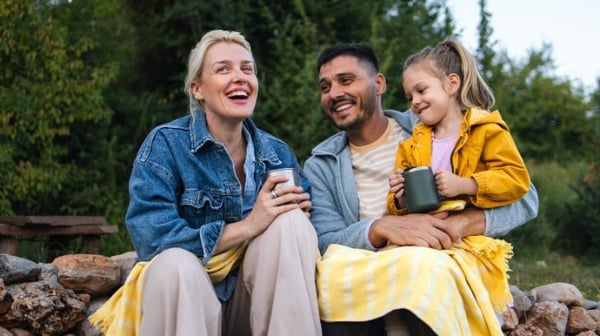
The cost of I do
14 August 2024
It’s no secret that weddings are a time-honoured tradition and a much-loved ceremony around the world. But the true cost of a wedding isn’t quite so clearcut.
At a time of rising costs and changing perspectives, is the sound of wedding bells as tempting as it once was? We polled more than 2,000 married or engaged couples to see if they had a big wedding – or a big rethink.
You might also be interested in...
Nuptials in numbers
For many couples, marriage is one of life’s most special milestones. But after the excitement of the fizz, flowers and first dance, there is inevitably a price to pay. And increasingly, that price tag is significant.
The average cost of a UK wedding is £20,700, according to a 2024 survey by Hitched. Similarly, another wedding planning app (Bridebook) estimated the cost of a wedding to be £20,775.
But are wedding planners budgeting for the big occasion? Our survey suggests they might need to fork out more than they think.
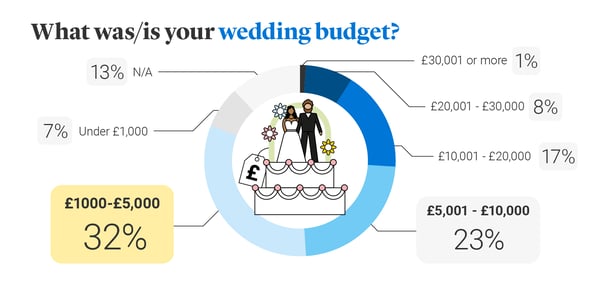
Excluding those who didn’t (or don’t) have a budget, the average amount set aside for a wedding was £8,997.32.
Across the generations, how do the budgets compare? Our survey showed that younger people are paying a much heavier price.
- 16-24-year-olds budget an average of £14,937.62 for the special day.
- In contrast, people aged over 55 put aside £4,614.43 for their wedding.
- Also, 69% of Gen Z respondents (16-24-year-olds) told us they’d exceeded their wedding budget, compared to just 18% of over 55s.
So, what’s behind this difference in generational spending? Have wedding costs risen over time, or do young people simply want to have their wedding cake and eat it?
Wedding costs have risen dramatically over recent decades, according to a commissioned by the Marriage Foundation. It found that even at today’s prices, the median cost of a wedding in the 1960s was less than £1,000. And between the 1970s and 1990s, it was just £1,000 to £5,000.
Clearly, weddings have come a long way from the days of getting hitched on a shoestring. But what’s behind this rise in wedding costs? Have our spending priorities shifted to bigger venues and other extras?
Till debt do us part
At a time of squeezed household budgets, there’s no doubt that many wedding planners are having to think on their feet when it comes to financing their special day.
- While only a small minority (16%) said they took out a loan to pay for their wedding, among 16-24-year-olds this was much higher – 38%.
- A fifth of Londoners (20%) said they took out a loan to pay for the big day. In contrast, people in Plymouth were the least likely (9%) to borrow.
- 63% of people said they got help from family or friends to pay for their wedding. The gap between the youngest and oldest respondents was huge – 85% of Gen Z received financial support from loved ones, compared to 42% of those aged over 55.
And increasingly, it’s not just the wedding cake we’re cutting, but our spending habits. A majority (52%) told us they’ve excluded some features of their original wedding plans for cost reasons.
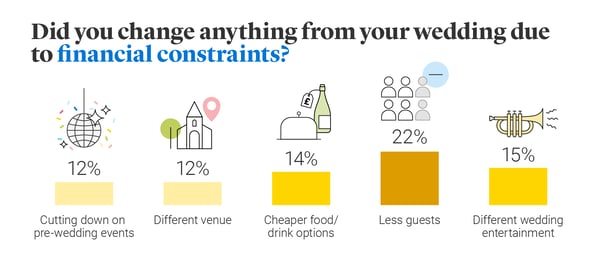
Size matters
As many brides and grooms-to-be will know, cutting that invite list is one of the trickiest parts of planning a wedding. We explored whether wedding planners prefer to keep things close-knit or a little larger (and costlier).
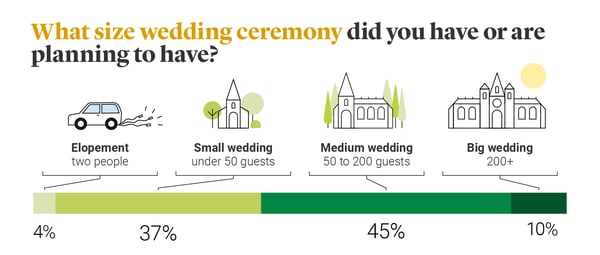
In almost every region we polled, medium-sized celebrations are the order of the day. The one exception was the north-east, where people are more likely to have a small wedding than a medium wedding – 43% versus 41%.
But if we zoom in on cities – rather than the wider regions – a different picture emerges. Smaller weddings were the top choice in six out of the 17 cities we polled; in fact, a majority of wedding planners (51%) in both Brighton and Norwich opted for a pint-sized wedding party.
There may also be cultural factors at play. According to global research published by Statista in 2024, Indian weddings have the largest number of guests – averaging 524 participants – followed by Mexican (185) and Brazilian (159) weddings. This may be one reason why Greater London had the highest percentage (22%) of respondents who answered ‘big wedding’, perhaps reflecting the wide range of cultural traditions in our capital.
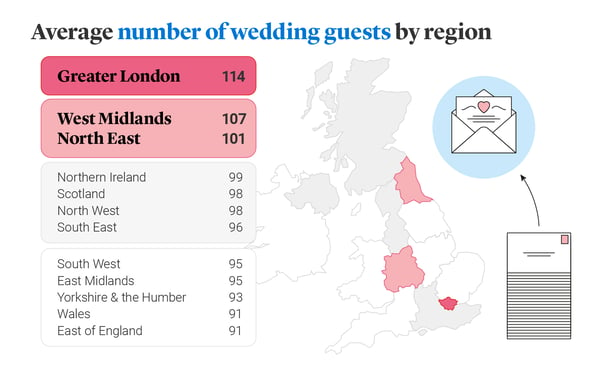
Our survey found that the average number of guests at a UK wedding is 99, reaching a high in Greater London (114) and a low in both Wales (91) and the East of England (91).
But while size matters – factoring in guests, venue hire and catering – there are other costs to consider.
Memories money can’t buy
Couples have undoubtedly felt the wedding planning pinch. But despite the rising cost of tying the knot, our survey found that the vast majority of people have no regrets.
- Even with the benefit of hindsight, a clear majority (55%) answered “no” when asked if they wish they’d spent their wedding budget on something else. In contrast, less than a quarter (23%) said they would spend the money differently, while 15% weren’t sure.
- This view was unanimous across the board – a majority said they have ‘no regrets’, regardless of age, gender and location.
- Of those who’d rather have spent the money differently, purchasing a property (43%) was the most frequently cited alternative for how they wish they’d spent their cash.
But while properties and pensions are sensible ways to invest money, weddings continue to have an intangible appeal.
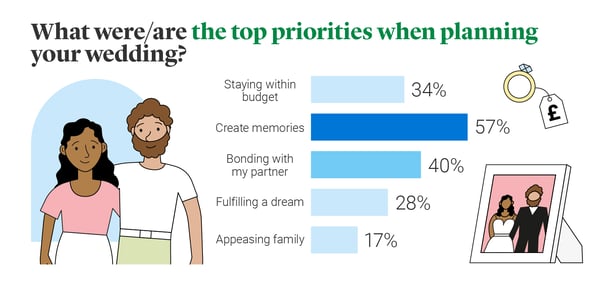
For most of us, a wedding isn’t just about the special day, but the memories that last a lifetime. In fact, ‘create memories’ was the most popular answer among males (53%) and females (60%), as well as every city and region – reaching a high of 66% in Newcastle.
Related articles

Single vs joint life insurance

Types of life insurance
